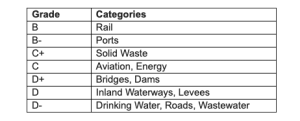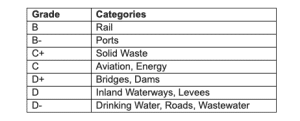Mississippi’s infrastructure is in fair condition but requires a facelift to ensure it remains viable in the future, a study from the American Society of Civil Engineers found.
The Mississippi chapter of the national civil engineering group released its 2024 report card for the state’s infrastructure on Thursday. 12 infrastructure categories were examined and graded individually. The final result was the Magnolia State earning an overall grade of “C-” — matching the national average.

Four of the 12 infrastructure categories (bridges, dams, rail, and solid waste) saw their grades increase compared to the previous report card, while two categories (drinking water and wastewater) saw their grades drop compared to the last report card, which was released in 2020.
“Mississippians have witnessed the consequences of underinvestment and deferred maintenance in infrastructure systems, especially when it comes to our most valuable, life-sustaining resource, the water we all need to survive,” said Jennifer Sloan Ziegler, P.E., chair of the 2024 Report Card for Mississippi’s Infrastructure.
“While there are some promising signs and some categories where grades are improving, there is still a lot of work to ensure Mississippi’s infrastructure remains reliable in the future.”
Both drinking water and wastewater fell from a “D” to a “D-” largely due to the infamous Jackson water crisis in 2022. According to the engineers, the crisis brought to light the risks to public health and safety that decades of neglecting routine maintenance at Jackson’s water systems.
While work has been done to restore the systems and ensure Jacksonians have access to clean drinking water since federal and state legislators invested historic levels of funding into fixing the capital city’s water infrastructure, not enough reliable data outlining improvement existed when the 2024 report card was released, according to the engineering group.
Mississippi has more than $8 billion in water system funding needs for the next two decades, according to the Environmental Protection Agency’s Drinking Water Infrastructure Needs Survey and Assessment — an increase from $4.6 billion in the last report card. Current funding only covers a small percentage of those needs, the study suggests.
A major issue found in Mississippi’s water systems overall is a high rate of treated water that is lost due to leaks. Some systems lose more than 30% of treated water, which is twice the industry standard. Jackson’s water system loss is more than 40%. Wastewater systems in Mississippi are also aging and face large repair costs.
Mississippi’s bridges saw a slight increase to a “D+” in the 2024 report card, compared to a “D-’” four years ago. Over the last four years, the percentage of bridges in poor condition dropped from 9.8% to 6.3%, though the percentage of bridges in good condition fell from 58.4% to 56.1%, and the number of bridges that have limits on the weight they can carry grew by more than 400.
The grade for roads in Mississippi is unchanged in the 2024 report card at a “D-.” Of the roads where pavement condition information exists, 24.3% are reportedly in poor condition. The Mississippi Department of Transportation is only able to rehabilitate 5% of these roads each year, despite being appropriated a record $2 billion from the state in 2023.
The state also estimates it has a $400 million funding gap for roads every year. Mississippi has the highest rate of roadway fatalities, with 25 deaths per 100,000 people annually.
RELATED: MDOT official warns construction projects will halt without more money
According to the report, the Mississippi Gulf Coast helps drive the economy of the state and nation, with ports and inland waterways playing an important role in getting products in and out of the United States.
Ports received the highest grade on the Report Card of “B-,” — consistent with its 2020 score. The state’s ports generate $17 billion in gross state product annually and support one out of every 10 jobs in Mississippi.
Many ports in the state saw extensive rehabilitation projects after Hurricane Katrina in 2005, while other ports built during the 1950s are nearing the end of their service life and lack updates to prepare them for severe weather and hurricanes. As shipping companies start using larger ships to move goods, expansion projects are needed to ensure Mississippi’s ports can receive those ships.
The state’s inland waterways, which help get products to and from ports, received a “D” grade. Barges on those waterways are said to face frequent delays, requiring extensive improvements so they can remain a reliable economic driver for the state. It is estimated Mississippi’s inland waterways need nearly $5 billion in upgrades over the next 20 years.
The following four recommendations were suggested by the American Society of Civil Engineers to raise Mississippi’s grade:
- Ensure that infrastructure investment is strategically focused on efforts that maximize good-paying jobs, promote the state’s economic competitiveness, and enhance usability so that all Mississippians continue to proudly call our state home.
- Increase funding for state agencies to ensure these critical agencies can carry out their mandated missions. Insufficient funding for decades has resulted in a lack of proper staffing, leading to delays in permitting, necessary approvals, and project execution, causing delayed or missed economic investments across the state.
- Design, operate, maintain, and expand Mississippi’s infrastructure systems using consensus-based codes, specifications, and standards that reduce the potential loss of jobs, economic opportunity, and critical natural resources. This includes advancing resiliency and mitigation measures to ensure better long-term use of taxpayer dollars.
- Invest in programs for technical career training – especially in the drinking water and wastewater sectors. Not only can investment help retain Mississippi’s talent and prevent continued “brain drain,” but it can also help mainstream tools for data-driven decision-making, such as the use of asset management software and life-cycle cost analysis to inform affordable rate structuring for the use of our infrastructure systems.
The next national infrastructure report card from the engineering group will be released in March 2025.
The post Mississippi infrastructure given ‘C-‘ grade from national engineering group appeared first on SuperTalk Mississippi.



